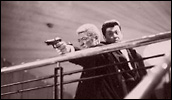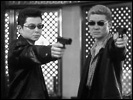Blood Brothers
- Year
- 2002
- Original title
- Ryuko Kyodai
- Japanese title
- 龍虎兄弟
- Director
- Cast
- Running time
- 96 minutes
- Published
- 23 December 2002


by Jason Gray
We're in the hull of a dark, leaky boat, jam-packed with Chinese immigrants on their way to Nihon. Two small boys huddle against their mother. One boy has a tattoo of a dragon sprawled down his arm, and the other a tiger. Whatever future awaits them, they pledge undying allegiance to each other.
Flash-forward - Yokohama's Chinatown. "Tiger" Noboru and "Dragon" Takeshi (Aikawa and Ozawa respectively, here in their tenth film together) are all grown up. They saunter into a restaurant and square up to a group of mainland Chinese men having some food. Despite their origins, Takeshi and his brother have no patience for the "foreign" crime element muscling their turf. After a short exchange in Mandarin (Ozawa speaks it often throughout the film), bullets are dispatched a la A Better Tomorrow, with the brothers blasting away in a style that would do Chow Yun-Fat proud. It's obvious from the outset that the film will begin and end with ballistics, it's only a matter of how many shells.
After the smoke clears, we're introduced to a number of characters, with the brothers' little co-owned watering hole serving as home base. A rumpled cop (Yosuke Natsuki) takes on the case, but he already knows who the culprits are - it's no more than a waiting game. Noboru's young girlfriend has decided to hook up with someone her own age (and unfortunately for him, part of their crew), while the bar's in-house chanteuse (Hiromi Nakajima) pines for Takeshi as she belts out tunes to empty seats. The brothers' beleaguered father (V-cinema vet Kentaro Shimizu) is the symbolic leader of the Takeda yakuza organization, but it's underboss Honda (Hiroyuki Konishi) who runs the show. Honda holds a secret meeting with the suave, white-clad leader of the mainland team, and the two feel their conflict of interest can be turned into a business opportunity.
The torch is passed from father to sons, and Shimizu emotionally reveals the true story of their mother's murder in flashback. Not two scenes later, he's found bludgeoned to death. The dogged detective susses out the connection between the old crime and the brewing war, but there's no stopping this head-on collision. Before the brothers can exact revenge, they're separated from each other, and from several of their limbs. After a long estrangement and convalescence (with Takeshi living in the gutter near the Takeda team's HQ), the brothers emerge on Chinese New Year's, peg-legged and with only a pair of arms between them. The action-filled final reel features some bone-crushing martial arts (one of the villains is a well-known K1 fighter), and several hundred rounds of ammunition, leading to the inevitable showdown.
Star and/or director of numerous gangster flicks, Hitoshi Ozawa (who pulls a 'Beat' Takeshi by crediting himself by his full name as an actor, but only as 'Ozawa' as a director) has a good feel for the crime genre and its trappings. The budget is fairly low, but the flashbacks are well timed and the cutting of the dramatic scenes is quite sharp. Although the gunplay is plentiful, it doesn't raise the bar in light of all the "gun-fu" of recent years. There is, however, an original visual gag during the final battle, where the limb-challenged pair "merge" to combine their firepower.
With decent lensing and a pounding ethnic score, Ozawa exposes the dark side of the picture postcard facade of Yokohama's Chinatown, succeeding in "B-movie" terms. The makeup effects are convincing, with a memorable, baroque image of the brothers' artful arms framed under glass as the baddie cackles in his throne. The timing of this film is way off, but for those who revel in the out-of-vogue Hong Kong "heroic bloodshed" cycle of the mid-'80s to early-'90s (and their dramatic precursor in the kung fu epics of the late '60s and early '70s), Blood Brothers forms the love child of that genre and the yakuza film. For all its amputations, it fuses the two styles seamlessly, and Ozawa obviously has a great affection for his source material. It just doesn't pack the punch of say John Woo's, Chang Cheh's, or Kinji Fukasaku's work, to name a few obvious influences.
Look for director Takashi Miike in a cameo as a homeless man (on a day off during his directing duties on Shangri-La?) who gives curb-bound Takeshi a little incentive to take revenge for all the street people (Ozawa appeared in both Dead or Alive and Agitator for Miike). Vet thesp Hideyo Amamoto (from numerous kaiju eiga) appears as a restaurant worker with some words of wisdom. Wen Suipin (the brothers' mom in the flashbacks) is the former Miss Taiwan, for the idol-inclined.